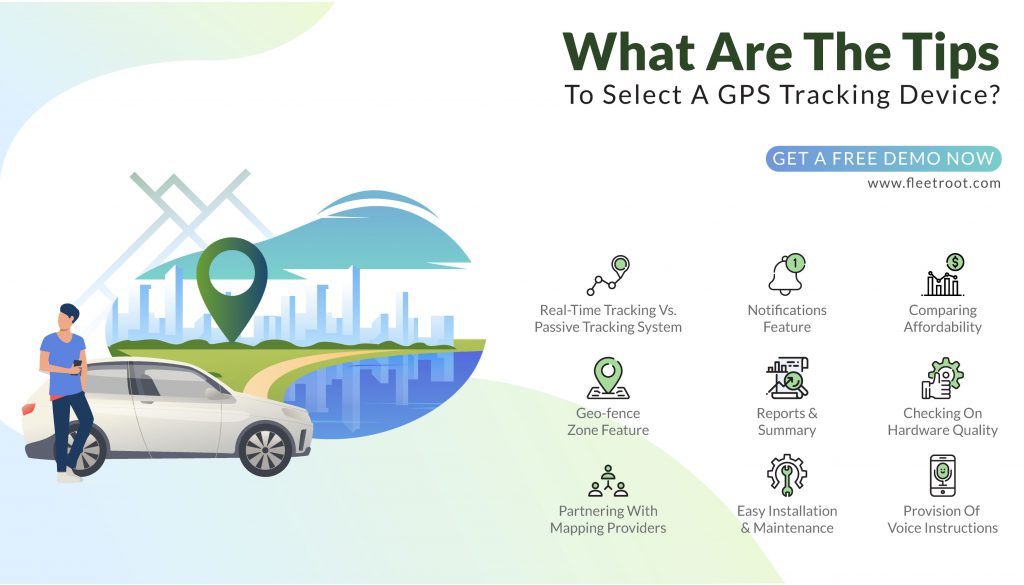Primarily, the GPS tracking system is used for gathering the real-time location of any vehicle. But only a good quality GPS system can guarantee the efficient transmission of the data to the server so that it reaches you quickly and the information is also very much accurate.
That is why you need to consider several factors prior to choosing a tracking device for your fleet of vehicles.

1. Real-Time Tracking Vs. Passive Tracking System
In a passive tracking system, all the GPS data is stored in the receiver unit, which you can download on a local server only after the vehicle returns. The Passive system collects information every 30 seconds but requires a lot of memory for storing the data.
On the other hand, active or real-time tracking use satellite or cellular modem for the GPS system. On the basis of its predetermined frequency, the tracker continuously updates the information in the server which varies from a frequency of 15 seconds to once in a day as per the arrangement.
It ensures that you are never at the risk of losing data.
2. Comparing Affordability
It is a general misconception that Passive tracking solutions are comparatively more affordable than a real-time solution. People feel that the monthly wireless fees makes the real-time system costlier.
But that is not at all correct.
Lately, the rates of the wireless rates have come down considerably making the option more affordable than the passive systems. On the contrary, the Wi-Fi infrastructure required for maintaining the passive tracking system on a regular basis makes it costlier.
Ideally, choosing the GPS tracking solution that suits your requirement is the best decision. Importantly, the price tags can also get altered due to the inclusion or exclusion of many accessories such as fuel sensor, impact sensor, etc.
3. Geo-fence Zone Feature
It is possible to set up predetermined zones on vehicles with a Geo-fence zone feature. It sends a notification every time any vehicle from your fleet leaves or enters a particular zone. It also helps a fleet manager to know when the vehicle is in a certain area especially when you are not keenly tracking it.
Such a feature can come handy for school buses as concerned parents can always check upon the location of their children using the Geo-fence zone element.
4. Real-Time Solutions For Effective Dispatching
Real-time tracking works best when it comes to effectively tracking vehicles and their locations on the map during the dispatching process.
Prompt availability of information allows a fleet operator to take immediate action during an emergency and ensure stress-free handling of the day-to-day operations.
5. Notifications Feature
While selecting an ideal GPS solution for tracking, make sure that it provides real-time notifications and alerts. The passive system leaves the fleet managers with no option but to constantly monitor the vehicle until it reaches the destination.
On the other hand, with the help of real-time solutions, the operator can easily track the vehicles 24/7 even from a remote location.
Such features are of great significance as a fleet manager cannot always restrict himself to the desk. With real-time tracking, you keep on receiving notifications and alerts through a mobile device or on the email.
Also, a quality tracker offers you options to set up notifications according to your requirement.
You can initiate alerts for driving behavior, excessive speeding, idling events, entering or exiting unwanted/undetermined geographical areas.
It also gives a manager insight into the behavior of the driver which can go a long way in preventing costly and unsafe activities in real time.
You can get all such details with real-time engine diagnostics.
6. Partnering With Mapping Providers
Having a quality mapping feature allows you to zoom your tracking device to the street levels.
The feature also comprises of other views such as birds-eye, satellite, and street maps.
So, while selecting a GPS system you must also get details about the mapping provider that can work in harmony with your selection and provide the up-to-date and accurate mapping.
Such facilities are imperative for the accurate tracking of the location of a vehicle.
7. Checking On Hardware Quality
Hardware quality is an important issue when it comes to GPS tracking devices.
There are a vast number of low-quality tracking units in the market.
You should be cautious before buying a GPS tracker and prefer high quality, waterproof, heat-resistant and impact-resistant devices.
Depending on the vehicle type, your tracker needs to have the ability to withstand harsh weather and the environmental conditions.
8. Easy Installation & Maintenance
Installation and maintenance of a tracking device can be quite complicated.
Devices with lots of buttons can be very difficult to operate.
Even if you have an expert for conducting all such skill-sets, it is advisable to choose a GPS that offers ease of both installation and maintenance.
There are various options available such as Marine GPS, GPS/PDA hybrid, Portable Outdoor GPS, and Car Navigation GPS.
Pick up the one that suits your requirement and also offers ease of operations.
9. Reports & Summary
A GPS system that comes with the feature of offering dashboard summary and historical reports can be of immense benefit to your fleet management company if you have a large fleet of vehicles to track.
This particular feature gives you direct access to reports and locations related to the specific event.
Many systems have the provision to offer you a record of the past 90 days.
Such records and data can be used for taking a crucial and informed decision that can be quite significant to your ROI. The tracker also puts forth the reports in the form of a graph on the dashboard.
Such data displays various details including the idling time, total distance traveled utilization, stoppages, and over-speeding. When you compare these metrics with other groups of vehicles traveling in different periods of time, it becomes easier to monitor the optimum level of your workforce.
On the basis of this data, a fleet owner can take appropriate decisions to ensure the fuel economy and increased profitability for their business.
10. Provision Of Voice Instructions
It is not always possible to check the inputs using the visual location maps especially if you are driving. So, always pick up a cloud-based GPS option that provides voice instructions and analytics and enables you to keep a tab on the predictive performance of your fleet.
So, while choosing a GPS tracking device for managing the fleet operations make sure that it offers all the above features and more so that your business really benefits from this decision.

